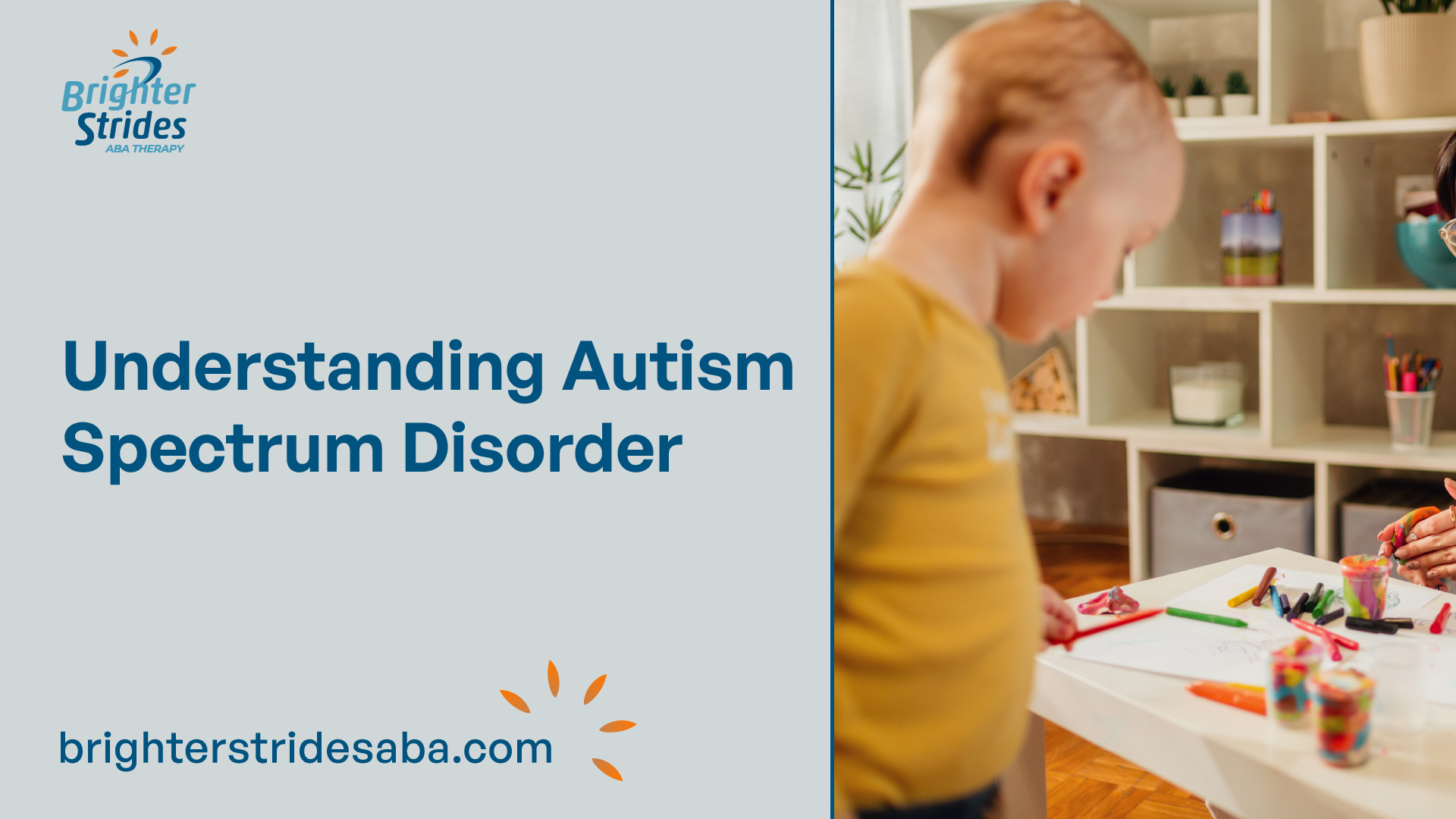
Understanding Autism Spectrum Disorder
Autism Spectrum Disorder (ASD) is a neurodevelopmental disorder characterized by persistent challenges in social interaction, communication, and restricted or repetitive behaviors. It is a complex condition that can vary widely in its presentation and severity.
What is Autism Spectrum Disorder?
Autism Spectrum Disorder (ASD) is a lifelong condition that affects individuals across their lifespan. It is typically diagnosed in early childhood, although some individuals may receive a diagnosis later in life. ASD encompasses a spectrum of conditions, ranging from mild to severe, with each individual experiencing a unique set of challenges and strengths.
People with ASD often have difficulties in social interactions and communication. They may struggle with understanding and expressing emotions, interpreting nonverbal cues, and engaging in reciprocal conversations. Individuals with ASD may also exhibit restricted interests, repetitive behaviors, and adherence to routines.
While the exact cause of ASD is still being researched, it is believed to result from a combination of genetic and environmental factors. Research suggests that there may be differences in brain structure and function in individuals with ASD.
Prevalence of Autism Spectrum Disorder
The prevalence of Autism Spectrum Disorder varies across different countries. In the United States, according to the Centers for Disease Control and Prevention (CDC), approximately 1 in every 54 children has been identified with ASD.
In Canada, ASD affects 1 in 66 children, with boys being four times as likely as girls to be diagnosed with ASD. Similarly, in Australia, estimates suggest that over 1 in 250 children have an Autism Spectrum Disorder, with the highest rate among males.
Understanding the prevalence of ASD helps to highlight the significance of autism support and services in different regions. By recognizing the needs of individuals with ASD and providing appropriate resources, communities can create an inclusive environment that supports their growth and development.
Factors to Consider in Choosing the Best States for Autism Resources
When it comes to choosing the best states for autism advocacy and resources, several factors need to be considered. Accessibility to healthcare services, availability of special education programs, and supportive autism legislation play crucial roles in ensuring individuals with autism receive the support they need. Let’s explore these factors in more detail.
Accessibility to Healthcare Services
Access to healthcare services is essential for individuals with autism spectrum disorder (ASD) to receive comprehensive care and support. It is important to assess the availability and quality of healthcare providers, including specialists in autism diagnosis and treatment. States that have a strong network of autism-specific healthcare providers and facilities can provide individuals with timely assessments, early interventions, and ongoing medical support.
Availability of Special Education Programs
Special education programs play a vital role in supporting the educational needs of individuals with autism. When evaluating states for autism resources, it is important to consider the availability and quality of special education programs, including inclusive classrooms, individualized education plans (IEPs), and access to speech therapy, occupational therapy, and other necessary services. States that prioritize inclusive education and provide robust support systems within schools can greatly enhance the educational experience for individuals with autism.
Supportive Autism Legislation
Supportive autism legislation can significantly impact the availability and affordability of resources for individuals with autism. Laws requiring private insurance coverage for autism-related services and specific mandates for applied behavior analysis (ABA) therapy can relieve financial burdens on families and ensure that necessary therapies are accessible. It is important to consider the presence of such legislation and the extent of coverage it provides when evaluating states for autism advocacy and resources.
To make an informed decision about the best states for autism resources, it is advisable to research national organizations that offer local assistance, local autism councils/committees, and state health agencies. These resources can provide valuable information about available resources, services, and opportunities for involvement in autism-related matters.
By considering the accessibility to healthcare services, availability of special education programs, and supportive autism legislation, individuals with autism and their families can identify states that offer comprehensive support and resources. Remember, finding the right state is just one step in the journey of supporting individuals with autism – continuous advocacy and access to resources remain crucial in promoting awareness, understanding, and the well-being of those with autism.

Best States for Autism Advocacy and Resources
When it comes to autism advocacy and resources, certain states stand out for their exceptional support systems. These states have made significant investments in research, treatment, and legislation to ensure individuals with autism have access to the necessary resources and services. Three states that have made notable strides in this area are Georgia, Indiana, and North Carolina.
Georgia: A Leader in Autism Research and Treatment
Georgia has emerged as a leader in autism research and treatment. The state is home to renowned autism centers such as Above & Beyond Therapy and the Emory Autism Center. These centers provide comprehensive services and support for individuals with autism and their families. The state has also implemented autism insurance laws, which require private insurance companies to cover autism-related services. This helps ease the financial burden on families seeking treatment and support.
Indiana: Excellent Autism Services and Support Programs
Indiana is known for its excellent autism services and support programs. The state has an autism insurance mandate in place, ensuring that coverage is provided for autism-related services. This mandate has been instrumental in improving access to crucial therapies and interventions for individuals with autism. Organizations like the Autism Society of Indiana and the Indiana Resource Center for Autism offer valuable resources, advocacy, and assistance to individuals and families affected by autism.
North Carolina: Care and Support for Individuals with Autism
North Carolina has made significant progress in providing care and support for individuals with autism. The state has implemented an autism insurance mandate, requiring coverage for autism-related services. This mandate ensures that individuals with autism have access to necessary therapies and interventions. Organizations like the Autism Society of North Carolina are dedicated to providing valuable assistance and resources to individuals and families affected by autism. North Carolina’s commitment to helping individuals with autism achieve their full potential is evident in the array of support services available in the state.
These states, along with others across the country, have recognized the importance of creating supportive environments for individuals with autism. By implementing legislation, supporting research, and providing access to resources, they strive to improve the lives of individuals with autism and their families. However, it’s important to note that the availability and quality of autism support and resources can vary within each state. It is recommended to research local resources and organizations to find the most appropriate assistance for individual needs.

Autism Legislation and Insurance Coverage
When it comes to supporting individuals with autism, legislation and insurance coverage play a crucial role in ensuring access to necessary resources and services. In this section, we will explore the various aspects of autism legislation and insurance coverage, including laws requiring private insurance coverage, variations in coverage for Applied Behavior Analysis (ABA) therapy, and states with mandates for autism-related services.
Laws Requiring Private Insurance Coverage
A significant step towards supporting individuals with autism has been the enactment of laws requiring private insurance companies to cover autism-related services. Currently, 42 states have such laws in place, ensuring that individuals with autism have access to the necessary treatments and interventions.
Variations in Coverage for ABA Therapy
Applied Behavior Analysis (ABA) therapy is a widely recognized and evidence-based treatment for individuals with autism. Among the states that have laws covering autism-related services, 25 states specifically require coverage of ABA therapy. However, it is important to note that the scope of coverage for ABA therapy can vary across states. Differences may include the maximum age of individuals covered by the laws and the specific services that insurers are required to cover.
States with Mandates for Autism-Related Services
In addition to laws requiring private insurance coverage, some states have gone a step further by enacting mandates that specifically address autism-related services. For example, Delaware, New Mexico, Texas, and Wyoming have laws that require state-regulated health plans to cover autism-related services [4]. These mandates ensure that individuals with autism have access to a comprehensive range of services and supports.
It is worth noting that while some states have laws requiring state-regulated health insurance plans to cover autism-related services, they may not specify coverage for ABA therapy. Currently, nine states fall into this category, emphasizing the need for continued advocacy and awareness to address the diverse needs of individuals with autism.
Furthermore, it is important to highlight that ongoing efforts are being made across the United States to address autism-related needs through legislation. Over 200 bills have been introduced in 41 states, covering areas such as insurance coverage, services and supports, employment, education, and safety issues. These initiatives reflect the commitment to improving the lives of individuals with autism and their families.
By implementing legislation and insurance coverage that specifically addresses the needs of individuals with autism, states can create an environment that fosters inclusivity, support, and access to essential services. These efforts not only benefit individuals with autism but also contribute to a more inclusive society that values and supports neurodiversity.
State-Level Prevalence of Autism Spectrum Disorder
Understanding the prevalence of Autism Spectrum Disorder (ASD) at the state level is crucial for planning and providing appropriate resources and support. The prevalence rates can vary from state to state, and it’s important to consider these variations in order to address the specific needs of individuals with autism. In this section, we will explore the variation in prevalence rates by state, identify states with high prevalence rates, and discuss the prevalence of autism in adults.
Variation in Prevalence Rates by State
The estimated state-level prevalence of autistic adults in the United States varies across different regions. According to World Population Review, the prevalence of autistic adults ranges from about 1.97% in Louisiana to 2.42% in Massachusetts. South Carolina is the only other state with a low prevalence below 2%. On the other hand, states with high prevalence rates above 2.3% include New Jersey, Illinois, Pennsylvania, Minnesota, California, Connecticut, and Virginia.
These variations in prevalence rates highlight the importance of tailoring resources and support based on the specific needs of each state’s population.
States with High Prevalence Rates
Several states in the United States have been identified as having higher prevalence rates of Autism Spectrum Disorder. These states include New Jersey, Illinois, Pennsylvania, Minnesota, California, Connecticut, and Virginia, as mentioned earlier. The higher prevalence rates in these states indicate a greater need for specialized services and support for individuals with autism and their families.
To effectively meet the needs of the autism community, these states have been actively working on enhancing their resources, programs, and legislation to ensure access to appropriate services and interventions. By focusing on early intervention, education, and employment opportunities, these states strive to provide comprehensive support for individuals with autism.
Understanding the Prevalence of Autism in Adults
While prevalence estimates for children with Autism Spectrum Disorder are available, there is a lack of existing surveillance systems to accurately determine the prevalence of autism in adults. However, in 2017, it was estimated that approximately 2.21% of U.S. adults aged 18 and older have ASD, totaling around 5,437,988 adults. These estimates were derived by applying existing data for children and adjusting for higher mortality rates among individuals with ASD using simulation and Bayesian hierarchical models.
Having estimates for adults with ASD is crucial for planning programs and services as children with autism transition into adulthood. These estimates help parents, service providers, and policymakers anticipate and provide necessary support for individuals with ASD as they navigate various life stages.
Understanding the state-level prevalence of Autism Spectrum Disorder is essential for ensuring that appropriate resources and support are available to individuals with autism and their families. By acknowledging the variations in prevalence rates, states can tailor their services and programs to meet the specific needs of their communities, ultimately improving the quality of life for individuals with autism.
Challenges and Support for Individuals with Autism
Living with Autism Spectrum Disorder (ASD) presents individuals with unique challenges that affect various aspects of their daily lives. Understanding these challenges is crucial for providing appropriate support and creating an inclusive environment. In this section, we will explore some common challenges faced by individuals with autism and the support they may need.
Challenges in Social Interactions and Emotional Recognition
Individuals with ASD may experience difficulties in social interactions and emotional recognition. They may struggle with understanding social cues, making eye contact, and engaging in reciprocal conversation. As a result, they may find it challenging to establish and maintain relationships with others. It is important to approach social interactions with patience, understanding, and clear communication, allowing individuals with autism to feel comfortable and supported.
Sensory Sensitivities and Unusual Mannerisms
People with ASD often exhibit extreme sensitivity to normal stimuli, such as sounds, lights, textures, or other sensory inputs that may seem overwhelming, confusing, or painful to them. This heightened sensitivity can extend to everyday items, such as the uniform of a police officer. Unusual mannerisms, such as repetitive vocalizations or hand flapping, may also be observed. These behaviors can be a way for individuals with autism to communicate or block out unwanted sensory input. They may intensify when the individual is agitated, uncomfortable, confused, or afraid.
Environmental Awareness and Risk Perception
People with ASD may have a limited understanding of their surroundings, which can lead to potentially dangerous situations. They may exhibit a lack of environmental awareness or have difficulty perceiving risks. For example, individuals with autism may stand in the street without showing concern for passing cars. It is important to provide appropriate guidance and support to ensure their safety in various environments.
To support individuals with autism, it is crucial to create an inclusive and understanding environment. Here are a few strategies:
- Educate and raise awareness about autism to foster understanding and acceptance.
- Provide social skills training and opportunities for social interactions.
- Offer sensory-friendly spaces and accommodations to minimize sensory overload.
- Foster a supportive and inclusive school and work environment.
- Encourage open communication and provide clear instructions.
- Promote the use of visual aids and assistive technologies to enhance communication and understanding.
By recognizing and addressing these challenges, we can support individuals with autism in their journey and help them thrive in all aspects of their lives.
Supporting Individuals with Autism
Supporting individuals with autism requires a comprehensive approach that focuses on early intervention and education, employment opportunities and support, as well as the importance of autism advocacy and access to resources.
Early Intervention and Education
Early intervention services are crucial for children with autism spectrum disorder (ASD). Every state in the US provides early intervention services for children with developmental delays. However, a study found that 25% of eligible children were not receiving these services, and 26% were only receiving one service. Early intervention can include high-intensity applied behavior analysis (ABA) therapy, which has shown to reduce autism symptoms and behavioral problems, and even achieve normal functioning in some children.
Under the Individuals with Disabilities Education Act (IDEA), every eligible child with a disability, including autism, is entitled to free and appropriate public education (FAPE) and related services in all public schools in the US. However, satisfaction with the services received varies, with only 36% of parents with autistic children being satisfied and over 50% desiring a different school for their child [9]. Inclusion classrooms, where children with autism learn alongside typically developing children, have been shown to promote self-esteem, better learning, and higher teacher expectations.
Employment Opportunities and Support
Employment rates for individuals with autism remain low, with 50 to 75% of working-age individuals being unemployed and less than one-third having employment. Individuals with autism face challenges in the workplace, including difficulty following directions, sensory challenges, behavior problems, and social skill difficulties. Programs that provide employment support, such as vocational training programs tailored to the strengths and interests of individuals with autism, have shown to improve their quality of life and subjective well-being.
Importance of Autism Advocacy and Access to Resources
Autism advocacy and access to resources are vital in supporting individuals with autism. Advocacy efforts raise awareness, promote understanding, and fight for the rights of individuals with autism. Access to resources, such as specialized services, therapies, and support networks, can significantly enhance the well-being and quality of life for individuals with autism.
To create an inclusive and supportive environment for individuals with autism, it is essential to prioritize early intervention and education, provide meaningful employment opportunities and support, and advocate for autism awareness and access to resources. By addressing these areas, we can foster a society that embraces and supports the unique abilities and needs of individuals with autism.
References
- https://educationonline.ku.edu/community/social-difficulties-in-autism-spectrum-disorder
- https://www.aboutkidshealth.ca/article?contentid=1494&language=english
- https://www.autismtas.org.au/about-autism/common-challenges/
- https://autismsociety.org/resources/public-policy/
- https://iacc.hhs.gov/resources/organizations/states/
- https://www.abtaba.com/blog/best-states-for-autism
- https://www.ncbi.nlm.nih.gov/pmc/articles/PMC9128411/
- https://www.hhs.texas.gov/services/disability/autism/autism-training-opportunities/autism-spectrum-disorders-training-program-first-responders/module-4-common-behavior-characteristics-individuals-autism-spectrum-disorder-asd
- https://www.ncbi.nlm.nih.gov/pmc/articles/PMC10849157/




